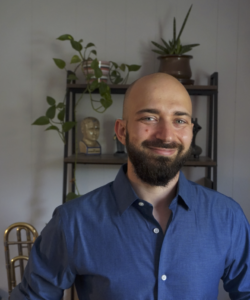Written by Benjamin Gold, Ph.D.
 Music has always been very important to me. I learned how to read with a sing-along book, and have relied on music to help me process and express my emotions for as long as I can remember. When I learned that scientists were harnessing music to help people with neurological diseases like Alzheimer’s or Parkinson’s, I knew I wanted to be involved.
Music has always been very important to me. I learned how to read with a sing-along book, and have relied on music to help me process and express my emotions for as long as I can remember. When I learned that scientists were harnessing music to help people with neurological diseases like Alzheimer’s or Parkinson’s, I knew I wanted to be involved.
I started studying neuroscience and music theory, bringing papers on music therapy into my classes as much as my professors would allow. I learned that musical therapies tended to work better when patients enjoyed the music, but that there wasn’t much scientific understanding of why that was. Then, just as I was finishing my bachelor’s degree, a new paper came out linking the emotional power of musical pleasure to dopamine release in the neural reward circuit. Three years later, I started my PhD with the main investigators behind that paper, exploring how music was able to tap into this deep-seated system. In a nutshell, we found that the human reward system was highly sensitive to musical expectations and surprise, and especially intermediately surprising music that wasn’t too boring or too chaotic for the listener.
This research raised a lot of new questions. I was especially interested in better understanding how the brain learned about ongoing music (and other stimuli) to develop new expectations in real time. Our finding of neural reward responses to intermediate surprise seemed to be closely related to theories that related optimal learning, focus, and pleasure to intermediate challenges – but none of these theories had explained how the brain transitions from an “unoptimized” to a “flow”-like state. I was also curious about how these neural phenomena related to the prominent effects that arousing stimuli like music can have on the rest of the body, like increasing heart rates or decreasing skin temperature. These interests led me to Dr. Catie Chang and her expertise in dynamic analyses and brain-body interactions. I was also excited to join Vanderbilt’s collaborative environment, take advantage of its resources for multidisciplinary research and career development, and of course enjoy Nashville’s thriving music scene.
I started my postdoc in October 2019, with big plans for an exciting new experiment. But just as I started drafting my IRB application, COVID-19 stopped me in my tracks. So I looked for existing datasets to study, and learned a lot about dynamic analyses and neural phenomena. I also learned more about Dr. Chang’s research on vigilance and its effects on physiological systems including the brain, heart, and lungs. Eventually, I started a new project on how brain-body interactions change with natural fluctuations in vigilance, which has led to some eye-opening insights on how the brain functions and how to interpret brain imaging analyses in that context. We submitted a manuscript on this work to a journal this month, and I’m very excited to branch into this new field and hear back from reviewers.
Meanwhile, my exploration of Nashville was also put on hold for a while, but I’ve enjoyed getting to know this city while I’ve had the chance. I love the food, music, and nearby nature. I’ve also gotten involved in local politics and policymaking, where I’ve met a great community of smart and motivated people working hard to make their neighbors’ lives better. So if I’m not in the lab, you can probably find me in an independent East Nashville café, at the State Capitol, or crunching data at a nearby think tank.